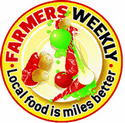Farmers Weekly Food Miles Campaign – Join the battle for local food

Why are you launching this food miles campaign?
Transporting food around the world is damaging to the environment, costs lots of money and means we are less secure as a nation.
Thirty-seven percent of our food is imported compared with 27% in 1995.
At a time when there is considerable focus on global security and the environment, it makes sense to cut food miles and to support British-produced food.
What do you hope to achieve with this food miles campaign?
We want our message Local Food is Miles Better to reach more than 5m people.
Our aim is to raise awareness of where food comes from and the consequences of high food miles by influencing key opinion formers and empowering readers to become local food champions to persuade the whole British public.
Are food miles really a problem
Lorry transport within the UK contributes to pollution.
If all food was consumed within 20km of where it was produced the country would save 2.1bn in environmental and congestion costs.
But air freight is rising too and although it represents just 1% of food miles, it accounts for 11% of food mile CO2 emissions.
Food miles aren’t surely the only measure of sustainability?
No, but a DEFRA food miles report acknowledges they’re a significant one.
Minimising food miles is a good way of moving further towards sustainable food production – sustainable for the environment and economically sustainable for producers.
Can people buy all their food locally to reduce food miles?
Of course not and there will always be food types we need to import, such as tea and coffee.
But people should be more questioning when they buy food.
Our food miles survey suggests that if local food was more clearly labelled in the supermarket, 82% would be more likely to buy it.
But the problem is it’s more expensive
That’s a myth.
We costed a typical basket of food from a number of farm shops around the country against the prices of two major supermarkets.
The two cheapest sources were farm shops, and the most expensive was one of the supermarkets.
Are you doing this to support British farmers not because you think local food is better?
We’re doing it because our consumer research says there’s a demand for local food, and that most believe it tastes better than alternatives, is better for their health, and is trusted more than imported food.
But you still want to help farmers?
Of course we want British farmers to prosper.
But we’re not alone.
93% of those we surveyed want to see UK producers more actively involved in promoting British and locally produced food and 96% know that buying locally produced food will help to support them.
It makes sense to want to buy home-produced food which is recognised as world-class for its welfare, hygiene, safety and traceability.
Won’t it hurt third-world farmers if the UK imports less?
It’s about choice and we support unequivocally the principle of Fair Trade.
We have to allow people the right to choose.
Buying seasonal, local food will help cut food miles on many key elements of our diet while we know that health experts recommend fruits such as oranges and bananas and clearly we don’t grow those, or tea or coffee.
How can we help to cut food miles?
Think about seasonality.
If it’s in season it should have attracted fewer food miles.
Shop at premises which support locally produced food.
Check labels when you’re buying and think if there’s a lower food miles alternative.
Pick restaurants that support local food – an increasing number do.
Visit farm shops and pick-your-owns.

